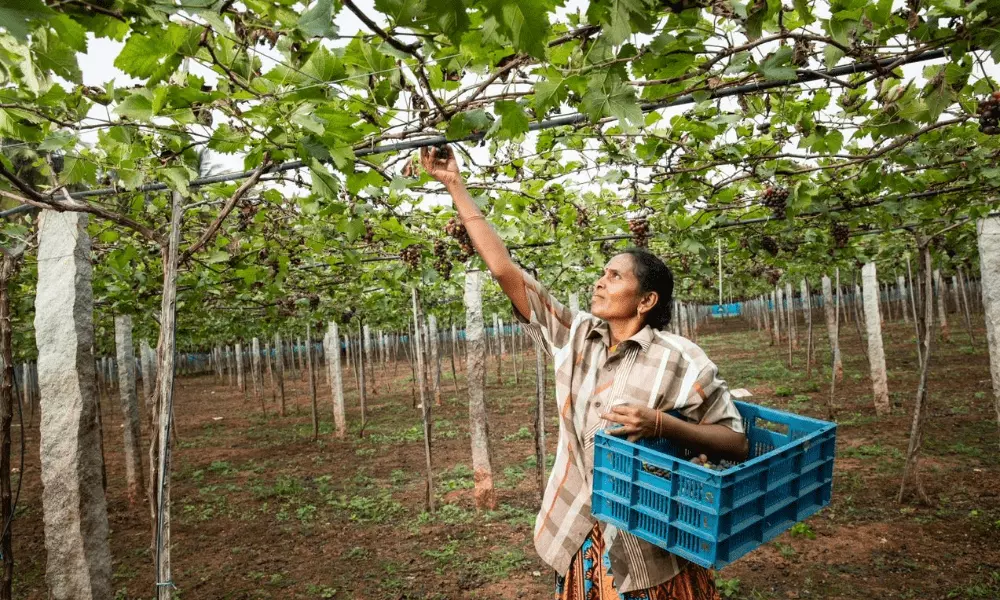
Refreshing Lives Of Indian farmers And Making A Real Difference: A Step Towards Self-Reliance
India, 11 Jan 2023 1:01 PM GMT | Updated 12 Jan 2023 8:10 AM GMT
How do we see sustainable agriculture in India, in the years to come? Seems like Coca-Cola is paving the path for it.
Think about the apple: red, ripe, and ephemeral pleasure as fleeting as a wonderful dream. What if the dream could last? Coca-Cola, with its Project Unnati, has devised a way to harvest more apples and other fruits like mangoes, oranges, grapes, litchis, and sugarcanes while bringing about a revolution in the horticulture industry in India. After speaking to a couple of Unnati farmers across the country, we want to narrate their stories, which could be indicative of India's Atmanirbhar journey for farmers in the country.
"Growing apples has been a profitable venture for me, and I have never been so happy and satisfied with my farm produce," said Sarita Devi, an Unnati farmer from Purola, Uttarakhand. Her illustrious apple orchard was not only a sight to admire but it also mirrored her smile and contented eyes while she narrated her journey.
But what is Project Unnati? "Project Unnati was launched with a vision to address the challenges of low farm productivity, poor technology adoption, and fruit wastage in the horticulture sector. It is our brainchild to make a concerted difference in the Indian fruit ecosystem by enhancing farming efficiency, which will lead to a significant increase in the farmer's income, thereby upscaling and enhancing their livelihoods," mentioned Mr Rajesh Ayapilla, Director-CSR and Sustainability, Coca-Cola INSWA.
Sarita Devi recalls having to wait 15 years to see the apples bloom; naturally, this served as a deterrent for her to pursue her dream of owning an orchard and profiting from the harvest. With Project Unnati, many like her adopted Good Agricultural Practices (GAP) coupled with Ultra-high-density fruit plantation technology (UHDFP) which enables a productivity increase of up to 5X for farmers. "Now the fruit produce turnaround time for apples is just a year. I can finally see a sustainable future for my family and children by adopting sustainable agricultural practices." Sarita Devi added.
India, a largely agrarian economy that depends heavily on the ancillary employment in agriculture for it to substantially contribute to the GDP, had started addressing the impending food crisis long ago. The honourable Prime Minister Narendra Modi's fervent call to action for a more self-sufficient India had several underlying meanings. Being self-sufficient not only demands relinquishing dependence on production but also nurturing and securing a future for generations to come. India, being one of the leading countries when it comes to farm produce, has been burgeoning its movement towards sustainable agriculture to ensure long-term viability and improve resilience to climate, market, and other changes. Accelerating the vision for a self-reliant India, Project Unnati is empowering and nurturing farmers to enhance horticulture productivity in 12 states, thereby upscaling their livelihoods and making their future sustainable.
K Preethi was among the first Unnati -grape farmers from Seepalakottai village in Tamil Nadu. Since she set up her vineyard a few years back, she has transcended herself to see a future beyond her farm and venture into entrepreneurship. "When we think about farming as a way of life, we need appropriate education and guidance. I saw an opportunity with Coca-Cola, and I grabbed it at the first chance. Now I am also learning to produce value-added grape products, like grape juice, grape oil, grape seed powder, raisins, cookies, etc ." Preethi mentioned.
Many Unnati farmers have been able to exponentially increase their income only through the adoption of a Package of Practices (POP) and superior germplasm. Over the past decade, Coca-Cola has brought over 10 thousand acres of land under Project Unnati and transformed the lives of lakhs of farmers and their families.
Siddharth Rana has always been the precocious kid in the family. Packing his big dreams in a satchel, he moved to the big city to pursue his graduation and subsequently get a job to support his family back in Uttarakhand. But he had a bigger calling waiting back in his homeland. "When I was introduced to Project Unnati, I decided to take a life-altering decision" Siddharth added. Away from traditional agriculture practices, Unnati offers a more "lucrative alternative" to many youths. With the introduction of more modern technologies and extensive training, increasingly farmers across India are choosing the "new way to fruit farming" that demands less physical toil yet is far more profitable.
Like Siddharth, Project Unnati has been able to accelerate the reverse migration of the young population of these villages who have started to see the potential in horticulture. "I was able to earn back the money I spent on my graduation studies in just one year," Siddharth mentioned as he demonstrated his apple orchard with quite a pride and zeal. "I have my own thing; I don't think I'll go back to the city. This is my life now."
"When we go back to our plan of action, all we do is remind ourselves why we started Unnati. We wanted to aid the farmers, who are the backbone of our economy, by providing them with a few tools to increase productivity and profitability. Additionally, at the core of our operations, we feel a country's future depends heavily on the empowerment of its women and youth. Hence, through Unnati and every initiative we pursue, our focus is primarily on empowering both of these sects." Mr Ayapilla added.
Project Unnati envisions a larger purpose of making India self-sufficient in fruit production. This will eventually lead to import substitution by encouraging increased production in domestic markets and enabling superior quality yields for consumption in India.
Furthering their commitment, Coca-Cola recently expanded Project Unnati to Odisha with 'Unnati Aamrit'. Project Unnati Aamrit aligns with the Government of India's priorities towards doubling farmers' income. It aims to increase mango productivity in Odisha by improving agricultural, economic, social, and environmental sustainability, thereby acting as a catalyst to help India achieve self-sufficiency in mango production.
In India, Coca-Cola offers a variety of products under the juices category, such as Maaza & Minute Maid. This year, the newly introduced Maaza Aam Panna will further propel the procurement of raw mangoes to meet the entrenched demand for ripe mango varieties. Coca-Cola has robust plans to amp up the procurement of mangoes and become one of the largest mango procurers in India.
The Logical Indian team applauds Coca-Cola's heartfelt commitment to augment India's agri-ecosystem. From benefiting Unnati farmers through Ultra-High-Density plantations to using drip irrigation for water conservation, Project Unnati mirrors the future of horticulture in India to increase crop yields and overall community development.
 All section
All section













